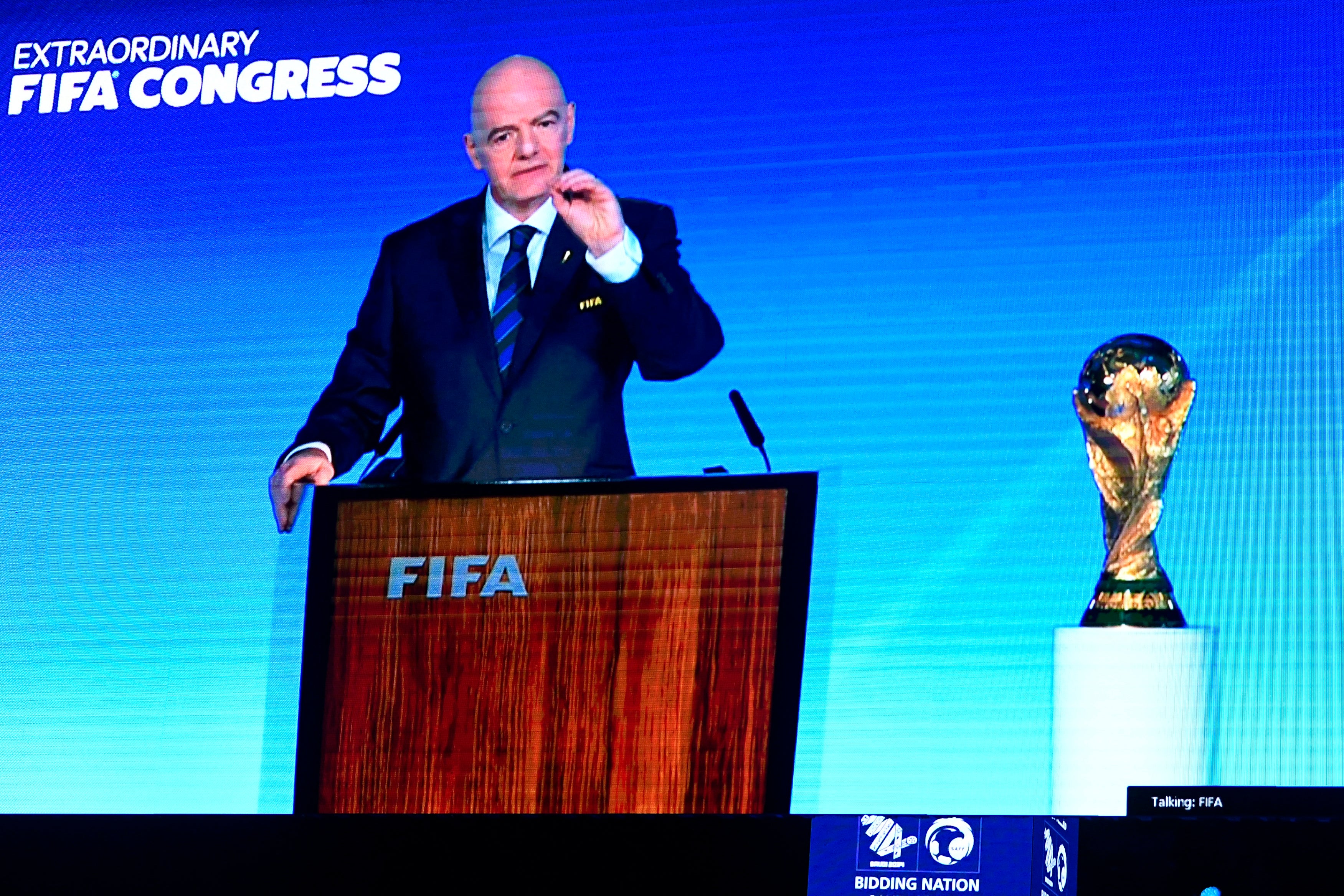
Saudi Arabia have been confirmed as hosts of the 2034 men’s World Cup.
The Middle East nation were the sole bidders for the finals in 10 years’ time, with an online Fifa Congress voting by acclamation in favour of their staging despite the huge controversy surrounding the bid.
The hosting rights for the centenary tournament in 2030 were rubberstamped at the same time, with Morocco, Portugal and Spain named as the principal co-hosts.
The opening match of that competition will be played in Uruguay, which hosted the inaugural 1930 finals, with the next two games to be staged in Argentina and Paraguay respectively before the rest of the tournament is played in the three main co-host countries.
The agreement for South America to stage the opening games in 2030 – reached in October last year – paved the way for Saudi Arabia to be sole hosts in 2034.
Saudi Arabia confirmed their interest in hosting on the same day the 2030 agreement was made public, with Fifa limiting further expressions of interest to nations from the Asian and Oceania confederations and setting a deadline of less than a month to declare that interest.
Australia, considered the only realistic challengers to Saudi Arabia, confirmed on October 31 last year that they would not be bidding.
The Football Association supported the 2030 and 2034 bids, and is expected to issue a statement later explaining its decision. The Football Association of Wales is also understood to have given its support.

The Norwegian football federation announced on Tuesday it would abstain from any vote by acclamation, and said the process Fifa had followed to determine the 2030 and 2034 hosts was “flawed”.
Human rights campaigners Amnesty International said last week there had been a “deafening silence” from national governing bodies over Saudi’s hosting, compared to how many spoke out regarding Qatar’s staging of the 2022 finals.
Amnesty has warned many migrant workers will die in getting Saudi Arabia ready to host without major reform to labour laws.
Any efforts to stage the 2034 finals in winter – as surely must happen to avoid searing daytime temperatures in the Saudi summer – are set to be opposed by Europe’s domestic leagues, who are already involved in a legal action against Fifa.
The European Leagues umbrella organisation – which includes the Premier League as a member – is holding a board meeting on Friday and, while this topic is not on the agenda, it may well be raised.

Saudi sports minister Prince Abdulaziz Bin Turki Al Faisal said: “FIFA Congress, allow me first of all to hand out my thanks to the trust that you have conveyed into the Kingdom of Saudi Arabia.
“It is a day that we invited the entire world to Saudi Arabia. We intend to have an extraordinary version of the World Cup held in our kingdom.”
The FA explained its support for 2030 and 2034 in a statement shortly after confirmation of the hosting decisions.
“Both bids are technically strong and meet the Fifa criteria to host the men’s World Cup,” it stated.
“Our focus is on ensuring that all our fans can attend and enjoy tournaments.
“The FA board met the Saudi Arabian Football Federation last month to discuss their bid in more detail.
“We asked them to commit to ensuring all fans would be safe and welcome in Saudi Arabia in 2034 - including LGBTQ+ fans. They assured us that they are fully committed to providing a safe and welcome environment for all fans.
“Football is a global game and is for everyone. Our commitment to diversity and inclusion means being respectful of all, including all religions and cultures.
“We also believe that hosting World Cups can be a catalyst for positive change, which is best delivered by working collaboratively in partnership with host nations.
“We will work with Fifa and UEFA to ensure that commitments to respect all human rights are delivered.”
Fifa president Gianni Infantino said: “We are aware of critics and fears and I fully trust our hosts to address all open points.
“We have a transparency that will shape real and lasting change. That is what we expect and what we look forward to, social improvements and positive human rights impacts. That is one of the responsibilities of hosting a World Cup, and the world will of course be watching.”







